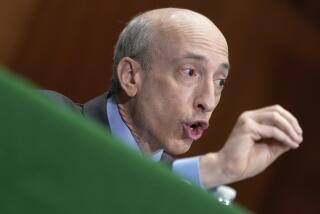SEC Preparing Rules on Fund Trading
- Share via
Federal regulators, engaged in a massive probe of illegal trading in mutual fund shares, said Thursday that they were moving quickly to develop new rules to stem abuses that cost investors billions of dollars.
Alongside New York Atty. Gen. Eliot Spitzer, the Securities and Exchange Commission is probing late-trading and market-timing transactions in shares of mutual funds. These practices deprive average investors of more than $5 billion a year in profits, according to studies.
Spitzer brought the abuses to light last month with an investigation that already has led to a $40-million settlement by a hedge fund. The probe has spread to scores of major mutual fund groups, brokerages, hedge funds and other institutions.
“The regulatory measures our staff is developing are designed to eliminate or minimize the possibility of these types of abuses occurring in the future,” SEC Chairman William H. Donaldson said.
As the commission scrambles to take action in an area where critics say it has been asleep at the wheel, Donaldson added: “I will not hesitate to call for other regulatory measures, if we discover additional information in the course of our investigation that merits regulatory action.”
Donaldson said he was ordering SEC staff to draw up possible new regulations for the five-member commission to consider “no later than next month.”
Market timing involves rapid buying and selling of shares, often in international mutual funds, to exploit outdated pricing information. It is permissible unless a fund declares publicly that it does not allow the practice and then lets some investors do it. The practice has been under SEC surveillance for years, but critics have said the agency has not done enough to stem it.
Donaldson said the SEC staff was considering rules to require clearer disclosure of funds’ timing policies, as well as a stronger emphasis on using so-called fair value pricing meant to minimize timing opportunities.
Late trading, the other practice being probed, is illegal. It involves buying and selling fund shares after the 4 p.m. Eastern time cutoff for setting the shares’ daily net asset value but executing deals at the 4 p.m. cutoff price. That allows selected traders to profit from knowledge of events that occur after the market closes for the day.
In this area, too, critics said, the SEC had fallen short.
“SEC inspection staff should have been going in and saying, ‘Hey, you’ve got orders coming in after 4 p.m. What are you doing to make sure that they actually originate before 4 p.m.?’ ” said Mercer Bullard, a securities law professor at the University of Mississippi. “If that were part of a routine inspection, it’s hard to believe that this late-trading problem would be so widespread.”
Donaldson said the SEC staff was looking at rules to require that funds, rather than intermediaries, ensure that orders are received before the cutoff time before letting an investor trade at that day’s price. “This would effectively eliminate the potential for late trading through intermediaries,” he said.
The fund companies initially targeted by Spitzer were Bank of America Corp.’s Nations Funds, Janus Capital Group Inc., Bank One Corp.’s One Group funds, and Strong Capital Management.
More to Read
Inside the business of entertainment
The Wide Shot brings you news, analysis and insights on everything from streaming wars to production — and what it all means for the future.
You may occasionally receive promotional content from the Los Angeles Times.










